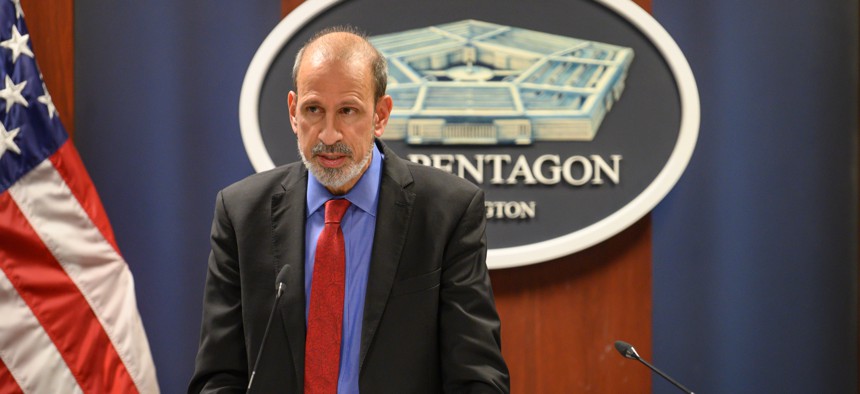Defense officials press lawmakers for a 2022 appropriation

Defense Department Comptroller Mike McCord shown here briefing the press on Nov. 15, 2021 Defense Department Photo by Staff Sgt. Brittany Chase
Defense officials warned lawmakers that some programs and tech efforts could be delayed or eliminated if Congress fails to pass a 2022 defense spending bill soon.
Defense officials told House appropriators on Wednesday that the military's purchasing power will take a hit if Congress fails to pass a full-year spending bill and relies on a full-year continuing resolution to fund the government for all of fiscal year 2022.
DOD, and the government writ large, has been operating on a continuing resolution since the start of the fiscal year on Oct. 1, 2021. The current CR expires Feb. 18. Military service chiefs testified that a yearlong CR was unprecedented and could have devastating consequences on tech modernization efforts.
For the Army, Gen. Joseph Martin, the Army's vice chief of staff, said progress on Project Convergence, an annual large-scale experiment demonstration held in the fall that evaluates existing and developing tech capabilities, could be slowed or stopped under a yearlong CR.
At the Air Force, continuing resolutions this year could cut $383 million in enterprise IT funding. Gen. Charles Brown, Jr. the chief of staff of the Air Force, said in written testimony that doing so "would handicap new initiatives to support cyber and information technology modernizations" and potentially increase network vulnerability for 180 Air Force installations.
The Navy would suffer a $2 billion budget shortfall in operations and maintenance, Adm. Michael Gilday, the chief of naval operations, wrote in submitted testimony, and could lead to "canceled support for Command, Control, Communications, Computers, Cyber, and Intelligence (C5I)."
Gen. John Raymond, the chief of space operations, testified that the CR would "prohibit the transfer of facility sustainment, restoration, and maintenance funds for 14 Space Force installations from the Air Force" and cut $23 million for the commercial satellite communications office charged with updating and consolidating how DOD buys commercial SATCOM services.
Mike McCord, the Defense Department's comptroller, testified that the impact of a continuing resolution for the fiscal year of 2022 could be up to triple the $8 billion difference between fiscal 2021 and 2021 budgets.
"We would estimate that the lost purchasing power would be more on the order of triple the $8 billion account level," he said, noting cost increases and misaligned funds such as those used for military construction or now defunct Afghanistan operations as examples.
"Time is money, and year after year we give away time in lengthy CRs. We do not have such an insurmountable edge that we can afford to fritter away one third of our time, year after year, while our competitors move as fast as they can," McCord wrote in his testimony.
But while everyone agrees that continuing resolutions aren't the best solution, there's also the argument that they aren't cataclysmic.
The Government Accountability Office released a report in September that found the Defense Department had developed coping mechanisms to lessen the negative effects of a continuing resolution and did not detect cost increases to the select acquisition programs it investigated.
The R Street Institute, a public policy think tank, sent a letter on Jan. 12 to the lead House defense appropriators Jan. 12 urging Congress to consider the GAO's findings, saying that "the management challenges presented by a CR should not be held out as an imperative greater than the need to enact fiscally sustainable policies and appropriations for FY 2022 and beyond."
Mandy Smithberger, the director for the Center for Defense Information at the
Project On Government Oversight, which signed onto the letter, told FCW via email that while CRs aren't "good", they don't necessarily equal a "catastrophe" either.
"I think there's some exaggeration occurring," Smithberger said. "CRs aren't good for any agency but it's not the catastrophe they're making it out to be, and if they're going to mislead Congress about this you have to question their credibility on a number of claims about the need for a larger budget and what our country needs to be strong."
Smithberger stressed that DOD has "a lot of authority to move money around," that Congress typically approves other reallocation requests, and there's an anomaly process that can also be used to make adjustments under a CR.
"A lot of the testimony is rooted in the idea that a CR will be executed as poorly as possible and the historical record shows that's not what actually happens," Smithberger said.






